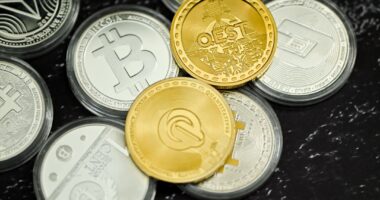Non-fungible tokens (NFTs) are unique digital assets that have gained significant attention in recent years. Unlike cryptocurrencies, which are interchangeable, each NFT has a distinct value and cannot be exchanged on a one-to-one basis. NFTs typically represent ownership or authenticity of digital items such as artwork, music, videos, or virtual real estate.
NFTs utilize blockchain technology, ensuring secure and transparent transactions. Each token is recorded on a decentralized ledger, making it tamper-proof and verifiable. This technology has created new opportunities for creators to monetize digital assets and for collectors to trade them.
The rise of NFTs has sparked interest in digital art and collectibles, as well as potential investment opportunities. NFTs provide proof of ownership and scarcity in the digital realm, leading to increased demand for unique virtual assets. Some NFTs have sold for substantial sums, with prices reaching millions of dollars in certain cases.
As the NFT market continues to expand, it is crucial for participants to understand both the potential benefits and risks associated with this emerging asset class. The technology behind NFTs has the potential to reshape how digital ownership and authenticity are verified and traded in various industries.
Key Takeaways
- NFTs are unique digital assets that represent ownership of a specific item or piece of content on the blockchain.
- Research market trends and demand to identify profitable NFT investments, and consider factors such as scarcity, utility, and the reputation of the creator.
- Artists and content creators can monetize their work by creating and selling NFTs, leveraging their fan base and engaging with NFT communities.
- When trading NFTs, consider factors such as liquidity, authenticity, and the potential for future value appreciation, and be mindful of transaction fees and market volatility.
- NFT staking and yield farming offer opportunities to earn passive income by holding and participating in the governance of NFT assets.
- The metaverse presents opportunities for profit through NFT gaming, virtual real estate, and other digital experiences, with potential for growth in virtual economies.
- NFT investment and trading can be leveraged with cryptocurrency such as Ethereum and Bitcoin, with considerations for interoperability and the evolving landscape of digital assets.
Investing in NFTs: How to Identify Profitable Digital Assets and Market Trends
Uniqueness and Scarcity of Digital Assets
One key factor to consider when evaluating NFT investments is the uniqueness and scarcity of the digital asset. Rare and one-of-a-kind NFTs tend to hold more value and have greater potential for appreciation over time.
Market Trends and Emerging Opportunities
Market trends also play a crucial role in NFT investment decisions. Keeping an eye on popular categories and emerging trends within the NFT space can help investors identify potential opportunities for growth. For example, digital art, virtual real estate, and collectible items from popular brands or celebrities have been hot categories in the NFT market. Understanding the demand for these types of assets can help investors make informed decisions about which NFTs to acquire for their portfolios.
The Importance of Blockchain Platforms
Another important consideration for NFT investors is the underlying blockchain platform on which the NFT is built. Ethereum has been the dominant blockchain for NFTs, but other platforms such as Binance Smart Chain and Flow are also gaining traction in the space. Evaluating the security, scalability, and user base of different blockchain platforms can help investors assess the long-term potential of their NFT investments.
Creating and Selling NFTs: Strategies for Artists and Content Creators to Monetize Their Work

For artists and content creators, NFTs offer a new way to monetize their work and connect with fans and collectors in the digital space. Creating and selling NFTs can be a rewarding endeavor, but it requires careful planning and strategy to maximize the potential for success. One key strategy for artists and creators is to leverage their existing fan base and social media presence to promote their NFTs.
Building hype and anticipation around a new NFT drop can help generate interest and drive sales when the NFT is released. Collaborating with other artists or influencers can also help expand the reach of an NFT project and attract new collectors. By partnering with like-minded creators, artists can tap into each other’s fan bases and create a sense of community around their NFT releases.
This can lead to increased exposure and demand for their digital assets. In addition to creating standalone NFTs, artists and content creators can also explore the concept of “tokenized communities” or “social tokens” as a way to engage with their audience and offer exclusive perks or access to their supporters. These social tokens can be used to unlock special content, experiences, or voting rights within a creator’s community, providing an additional revenue stream and incentive for fans to participate in the creator’s ecosystem.
Trading NFTs: Tips for Buying, Selling, and Speculating on NFT Marketplaces
Trading NFTs requires a deep understanding of market dynamics and trends, as well as the ability to identify valuable digital assets. When buying NFTs, it is important to consider factors such as rarity, demand, and the reputation of the creator or brand behind the NFT. Conducting thorough research on the history of similar NFT sales and market trends can help inform buying decisions and minimize the risk of overpaying for an asset.
Selling NFTs also requires careful consideration of timing and pricing. Understanding market sentiment and demand for specific types of NFTs can help sellers determine the best time to list their assets for sale. Additionally, setting a competitive price based on comparable sales and market conditions can attract potential buyers and increase the likelihood of a successful sale.
Speculating on NFT marketplaces involves taking calculated risks based on an analysis of market trends and potential future developments. Keeping an eye on emerging artists, upcoming collaborations, and new trends within the NFT space can help speculators identify undervalued assets with growth potential. However, it is important to approach speculation with caution and avoid making impulsive decisions based solely on hype or speculation.
NFT Staking and Yield Farming: Earning Passive Income with Non-Fungible Tokens
NFT staking and yield farming have emerged as popular ways for NFT holders to earn passive income on their digital assets. Staking involves locking up NFTs in a smart contract in exchange for rewards such as additional tokens or access to exclusive features within a platform or community. By staking their NFTs, holders can contribute to the security and functionality of a blockchain network while earning rewards for their participation.
Yield farming, on the other hand, involves providing liquidity to decentralized finance (DeFi) protocols by staking NFTs in exchange for interest or rewards in the form of additional tokens. This allows NFT holders to generate passive income by leveraging their digital assets in DeFi applications. Both staking and yield farming offer opportunities for NFT holders to put their digital assets to work and earn additional income beyond simply buying and selling NFTs.
However, it is important for participants to carefully evaluate the risks and potential returns associated with staking and yield farming activities before getting involved.
NFT Gaming and Virtual Real Estate: Exploring Opportunities for Profit in the Metaverse

Investing in NFT Gaming Assets
To capitalize on the growing demand for virtual goods, investors need to have a deep understanding of the gaming industry, including popular game titles, emerging trends, and the potential for in-game economies to thrive. By acquiring rare or sought-after in-game items as NFTs, investors can profit from the growing demand for virtual goods within gaming communities.
Virtual Real Estate: A New Investment Opportunity
Virtual real estate within metaverse platforms such as Decentraland, The Sandbox, and Cryptovoxels has also become a popular investment opportunity. Land parcels within these platforms can be tokenized as NFTs, allowing investors to speculate on the future value of virtual real estate as these metaverse projects continue to evolve.
The Future of Virtual Worlds
As the metaverse continues to grow and evolve, the potential for profit from NFT gaming and virtual real estate investments is vast. With the ability to buy, sell, and trade digital goods and virtual assets, investors who are willing to take the leap into this new frontier may reap significant rewards.
NFTs and Cryptocurrency: Leveraging Ethereum, Bitcoin, and Other Digital Assets for NFT Investment and Trading
NFTs are closely intertwined with cryptocurrency, particularly Ethereum, which has become the dominant blockchain platform for creating and trading non-fungible tokens. Ethereum’s smart contract functionality enables the creation of unique digital assets as NFTs, while its decentralized nature ensures transparency and security for NFT transactions. Bitcoin has also entered the NFT space through initiatives such as tokenizing physical art pieces as digital collectibles on the Bitcoin blockchain.
While Bitcoin’s capabilities for supporting complex smart contracts are limited compared to Ethereum, its prominence in the cryptocurrency market has led to experimentation with NFT applications on its blockchain. In addition to Ethereum and Bitcoin, other blockchain platforms such as Binance Smart Chain, Flow, Tezos, and Polkadot have also seen increased adoption for creating and trading NFTs. Understanding the capabilities and limitations of different blockchain platforms can help investors navigate the diverse landscape of NFT projects and marketplaces.
In conclusion, non-fungible tokens have opened up new frontiers for digital ownership, creativity, investment opportunities, passive income generation, gaming experiences, virtual real estate development, and integration with cryptocurrency ecosystems. As the NFT space continues to evolve, it is essential for participants to stay informed about market trends, technological developments, regulatory considerations, and best practices for engaging with non-fungible tokens in a responsible manner. Whether you are an artist looking to monetize your work through NFTs or an investor seeking opportunities within this burgeoning asset class, understanding the nuances of non-fungible tokens is crucial for navigating this exciting new frontier in the digital economy.
FAQs
What is an NFT?
An NFT, or non-fungible token, is a digital asset that represents ownership or proof of authenticity of a unique item or piece of content, such as artwork, videos, music, or other digital collectibles.
How do NFTs work?
NFTs are created, bought, and sold on blockchain platforms, typically using cryptocurrency. Each NFT contains unique metadata that distinguishes it from other tokens, making it one-of-a-kind and non-interchangeable.
How can I make money with NFTs?
There are several ways to make money with NFTs, including creating and selling your own digital artwork or collectibles, investing in NFTs that may increase in value over time, and participating in NFT trading and marketplaces.
What are some strategies for profiting from NFTs?
Some strategies for profiting from NFTs include identifying emerging trends and popular artists or creators, building a strong online presence to promote and sell your NFTs, and staying informed about the latest developments in the NFT market.
Are there risks involved in investing in NFTs?
Yes, like any investment, there are risks involved in investing in NFTs. The value of NFTs can be volatile, and there is the potential for scams and fraudulent activity in the NFT market. It’s important to do thorough research and exercise caution when investing in NFTs.





